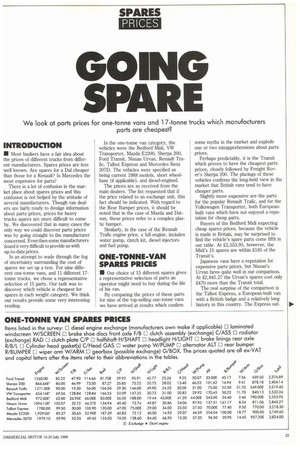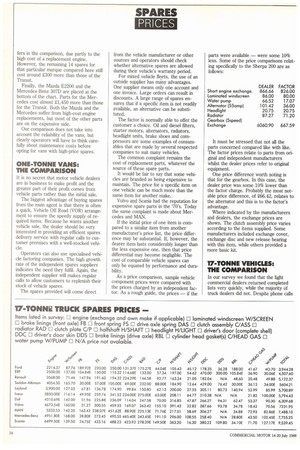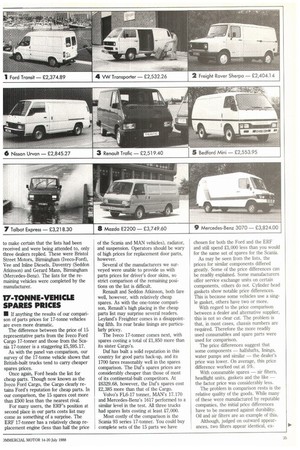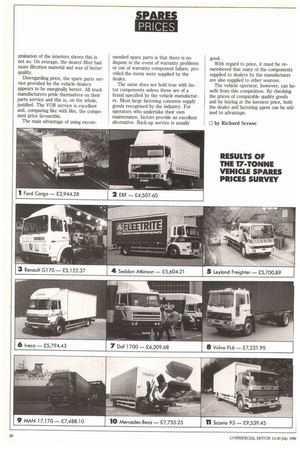GOING SPARE
Page 29

Page 30

Page 31

Page 32

If you've noticed an error in this article please click here to report it so we can fix it.
We look at parts prices for one-tonne vans and 17-tonne trucks which manufacturers parts are cheapest?
INTRODUCTION
IN Most hauliers have a fair idea about the prices of different trucks from different manufacturers. Spares prices are less well known. Are spares for a Daf cheaper than those for a Renault? Is Mercedes the most expensive for parts?
There is a lot of confusion in the market place about spares prices and this confusion is not helped by the attitude of several manufacturers. Though van dealers are fairly ready to divulge information about parts prices, prices for heavy trucks spares are more difficult to come by. We discovered that in many cases the only way we could discover parts prices was by going straight to the manufacturer concerned. Even then some manufacturers found it very difficult to provide us with up-to-date prices.
In an attempt to wade through the fog of uncertainty surrounding the cost of spares we set up a test. For nine different one-tonne vans, and 11 different 17tonne trucks, we chose a representative selection of 15 parts. Our task was to discover which vehicle is cheapest for spares in each weight category. We think our results provide some very interesting reading. In the one-tonne van category, the vehicles were the Bedford Midi, VW Transporter, Mazda E2200, Sherpa 200, Ford Transit, Nissan Urvan, Renault Trafic, Talbot Express and Mercedes Benz 307D. The vehicles were specified as being current 1988 models, short wheelbase (if applicable), and diesel-engined.
The prices are as received from the main dealers. The list requested that if the price related to an exchange unit, this fact should be indicated. With regard to the Rear Bumper prices, it should be noted that in the case of Mazda and Datsun, these prices refer to a complex plastic bumper.
Similarly, in the case of the Renault Trafic engine price, a full engine, includes water pump, clutch kit, diesel injectors and fuel pump.
ONE-TONNE-VAN SPARES PRICES • Our choice of 15 different spares gives a representative selection of parts an operator might need to buy during the life of his van.
By comparing the prices of these parts for nine of the top-selling one-tonne vans we have arrived at results which confirm some myths in the market and explode one or two misapprehensions about parts prices.
Perhaps predictably, it is the Transit which proves to have the cheapest parts prices, closely followed by Freight Rover's Sherpa 200. The placings of these vehicles confirms the long-held view in the market that British vans tend to have cheaper parts.
Slightly more expensive are the parts for the popular Renault Trafic, and for the Volkswagen Transporter, both Europeanbuilt vans which have not enjoyed a reputation for cheap parts.
Buyers of the Bedford Midi expecting cheap spares prices, because the vehicle is made in Britain, may be surprised to find the vehicle's spare parts come fifth in our table. At 22,553.95, however, the Midi's 15 spares are within £185 of the Transit's.
Japanese vans have a reputation for expensive parts prices, but Nissan's Urvan fares quite well in our comparison. At £2,845.27 the Urvan's spares cost only £470 more than the Transit total.
The real surprise of the comparison is the Talbot Express, a European-built van with a British badge and a relatively long history in this country. The Express suf fers in the comparison, due partly to the high cost of a replacement engine. However, the remaining 14 spares for that particular marque compared here still cost around 2300 more than those of the Transit.
Finally, the Mazda E2200 and the Mercedes-Benz 307D are placed at the bottom of the chart. Parts for the Mercedes cost almost 21,450 more than those for the Transit. Both the Mazda and the Mercedes suffer from high-cost engine replacements, but most of the other parts are on the expensive side.
Our comparison does not take into account the reliability of the vans, but clearly operators will have to think carefully about maintenance costs before opting for vans with high-price spares.
ONE-TONNE VANS: THE COMPARISON
It is no secret that motor vehicle dealers are in business to make profit and the greater part of their profit comes from vehicle parts rather than the initial sale.
The biggest advantage of buying spares from the main agent is that there is often a quick, Vehicle Off Road (VOR) arrangement to ensure the speedy supply of required items. Because he wants another vehicle sale, the dealer should be very interested in providing an efficient spares delivery service with regular calls to customer premises with a well-stocked vehicle.
Operators can also use specialised vehicle factoring companies. The high growth rate of the independent spares suppliers indicates the need they fulfil. Again, the independent supplier will makes regular calls to allow customers to replenish their stock of vehicle spares.
The spares provided will come direct
from the vehicle manufacturer or other sources and operators should check whether alternative spares are allowed during their vehicle's warranty period.
For mixed vehicle fleets, the use of an outside supplier has many advantages. One supplier means only one account and one invoice. Large orders can result in discounts. A large range of spares ensures that if a specific item is not readily available, an alternative can be substituted.
The factor is normally able to offer the customer a choice. Oil and diesel filters, starter motors, alternators, radiators, headlight units, brake shoes and cornpressors are some examples of consumables that are made by several respected companies to suit many vehicles.
The common complaint remains the cost of replacement parts, whatever the source of these spare parts.
It would be fair to say that some vehicles are branded as being expensive to maintain. The price for a specific item on one vehicle can be much more than the same item for another make.
Volvo and Scania had the reputation for expensive spare parts in the '70's. Today the same complaint is made about Mercedes and MAN.
If the initial price of one item is compared to a similar item from another manufacturer's price list, the price difference may be substantial. If, however, the dearer item lasts considerably longer than the less expensive one, then that price differential may become negligible. The cost of comparable vehicle spares can only be equated by performance and durability.
As a price comparison, sample vehicle component prices were compared with the prices charged by an independent factor. As a rough guide, the prices if the parts were available were some 10% less. Some of the price comparisons relating specifically to the Sherpa 200 are as follows:
It must be stressed that not all the parts concerned compared like with like. The factor prices relate to parts from original and independent manufacturers whilst the dealer prices refer to original equipment.
One price difference worth noting is that for the gearbox. In this case, the dealer price was some 10% lower than the factor charge. Probably the most notable price difference, of 266.42, relates to the alternator and this is to the factor's advantage.
Where indicated by the manufacturers and dealers, the exchange prices are shown. The clutch assembly price varies according to the items supplied. Some manufacturers included exchange cover, exchange disc and new release bearing with this item, while others provided a more basic kit.
17-TONNE VEHICLES: THE COMPARISON
In our survey we found that the light commercial dealers returned completed lists very quickly, while the majority of truck dealers did not. Despite phone calls to make certain that the lists had been received and were being attended to, only three dealers replied. These were Bristol Street Motors, Birmingham (Iveco-Ford), Vee and Inline Diesels, Daventry (Seddon Atkinson) and Gerard Mann, Birmingham (Mercedes-Benz). The lists for the remaining vehides were completed by the manufacturer.
17-TONNE-VEHICLE SPARES PRICES
• If anything the results of our comparison of parts prices for 17-tonne vehicles are even more dramatic.
The difference between the price of 15 representative parts from the Iveco Ford Cargo 17-tonner and those from the Scania 17-tonner is a staggering £5,595.17.
As with the panel van comparison, our survey of the 17-tonne vehicle shows that British-built trucks tend to carry cheaper spares prices.
Once again, Ford heads the list for cheap parts. Though now known as the Iveco Ford Cargo, the Cargo clearly retains Ford's reputation for cheap parts. In our comparison, the 15 spares cost more than £500 less than the nearest rival.
For many users, the ERF's position at second place in our parts costs list may come as something of a surprise. The ERF 17-tonner has a relatively cheap replacement engine (less than half the price of the Scania and MAN vehicles), radiator, and suspension. Operators should be wary of high prices for replacement door parts, however.
Several of the manufacturers we surveyed were unable to provide us with parts prices for driver's door skins, so strict comparison of the remaining positions on the list is difficult.
Renault and Seddon Atkinson, both fare well, however, with relatively cheap spares. As with the one-tonne comparison, Renault's high placing in the cheap parts list may surprise several readers. Leyland's Freighter comes in a disappointing fifth. Its rear brake linings are particularly pricey.
The Iveco 17-tonner comes next, with spares costing a total of 21,850 more than its sister Cargo's.
Daf has built a solid reputation in this country for good parts back-up, and its 1700 fares reasonably well in the spares comparison. The Daf's spares prices are considerably cheaper than those of most of its continental-built competitors. At £6329.68, however, the Daf's spares cost £2,385 more than that of the Cargo.
Volvo's FL6-17 tonner, MAN's 17.170 and Mercedes-Benz's 1617 performed to a similar level in the test. All three trucks had spares lists costing at least £7,000.
Most costly of the comparison is the Scania 93 series 17-tonner. You could buy complete sets of the 15 parts we have chosen for both the Ford and the ERF and still spend £1,000 less than you would for the same set of spares for the Scania.
As may be seen from the lists, the prices for similar components differed greatly. Some of the price differences can be readily explained. Some manufacturers offer service exchange units on certain components, others do not. Cylinder head gaskets show notable price differences. This is because some vehicles use a single gasket, others have two or more.
With regard to the price comparison between a dealer and alternative supplier, this is not so clear cut. The problem is that, in most cases, chassis numbers are required. Therefore the more readily used consumables and spare parts were used for comparison.
The price differences suggest that some components — halfshafts, linings, water pumps and similar — the dealer's price was lower. On average, this price difference worked out at 5%.
With consumable spares — air filters, headlight units, gaskets and the like — the factor price was considerably less.
The problem in comparison rests is the relative quality of the goods. While many of these were manufactured by reputable companies, the initial price differences have to be measured against durability. Oil and air filters are an example of this.
Although, judged on outward appearances, two filters appear identical, ex amination of the interiors shows this is not so. On average, the dearer filter had more filtration material and was of better quality.
Disregarding price, the spare parts service provided by the vehicle dealers appears to be marginally better. All truck manufacturers pride themselves on their parts service and this is, on the whole, justified. The VOR service is excellent and, comparing like with like, the component price favourable.
The main advantage of using recom mended spare parts is that there is no dispute in the event of warranty problems or out of warranty component failure, provided the items were supplied by the dealer.
The same does not hold true with factor components unless these are of a brand specified by the vehicle manufacturer. Most large factoring concerns supply goods recognised by the industry. For operators who undertake their own maintenance, factors provide an excellent alternative. Back-up service is usually good.
With regard to price, it must be remembered that many of the components supplied to dealers by the manufacturer are also supplied to other sources.
The vehicle operator, however, can benefit from this competition. By checking the prices of comparable quality goods and by buying at the keenest price, both the dealer and factoring agent can be utilised to advantage.














































